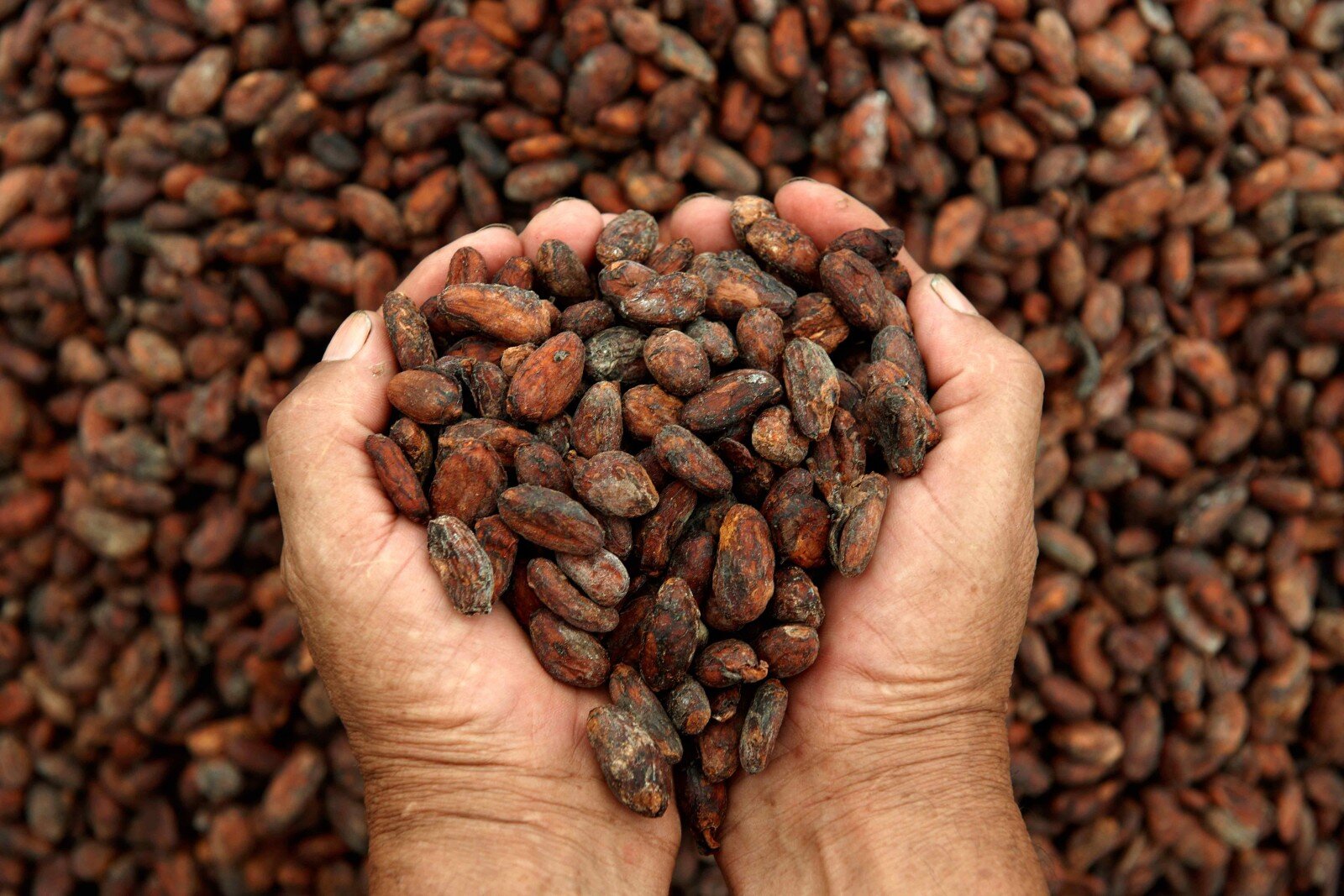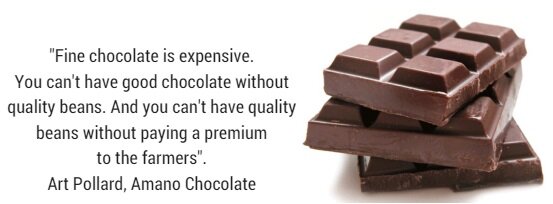The Best Way To Source Fine Cacao In 2016
How do professionals source fine cacao?
Instagram is now filled with pictures of chocolate makers smiling in the middle of cocoa plantations in Costa Rica, Dominican Republic, Venezuela and other exotic locations. Colorful trees, magnificent sunsets, immense forests. Scrolling through their accounts is a pleasure for the eyes, and it creates a tingling "wish I were there" kind of feeling. But sourcing fine cacao has little to do with fancy trips in the jungle.
It's a struggle, a challenge, a big, huge risk with no guarantees.
Chocolate makers are constantly on the hunt for the best cacao in the World.
This misconception might be one of the reasons why Ecole Chocolat - award winning school for making chocolate and crib of successful chocolate makers and chocolatiers since 2003 - decided to dedicate an entire Google Hangout on May 19th to the subject of sourcing fine flavored cocoa beans. Guests of the discussion were renewed chocolate professionals Art Pollard from Amano Chocolate and Greg D'Alesandre from Dandelion Chocolate that explained the difficulties encountered every day in finding and sourcing the best cacao around the World.What should chocolate makers take into consideration during such crucial activity?
Art and Greg gave great pieces of advice directed to those who approach the challenge of sourcing cocoa beans for the first time, or those who haven't had much luck yet and are getting discouraged. Based on their long-time experience, here is the best way to go about such a fascinating but very risky business.
BRIDGE THE CULTURAL GAP
Few are the cases where the chocolate is made in the same country where the cacao is produced. Cacao grows 20 degrees North and South the Equator in developing countries and is mainly exported to serve chocolate makers in Europe and in the USA. Those who decide to venture into sourcing beans themselves have a big challenge to face: get to know the people they will work with.
As Greg from Dandelion Chocolate pointed out:
"There is a lot of TRUST involved in sourcing cocoa beans".
Containers worth thousands of dollars are shipped from remote locations with no guarantee other than a handshake or a weak contract. The legal system doesn't help preventing sellers from walking away with money paid in advance. Art Pollard told the story of a famous chocolate brand that paid a local priest $30.000 to buy cocoa at the end of the season only to hear the priest saying months later that he gave it all to families in need. And there is nothing that he could do about it!
Even if everything works out and the beans get shipped, there is still the chance that the cacao is of bad quality, not worth the money or unusable. The beans shipped might not be the same ones promised during the visit at the plantation. Therefore, establishing a relationship of trust with the farmers in the places of origin is crucial to avoid big disappointments.
How to build this trust?
Getting to know the people have the priority above everything.
By spending time with the cocoa farmers, chocolate makers gather important info: the level of experience and expertise in harvesting cacao; how the local culture affects daily practices and productivity levels; what farmers prioritize in their lifestyle and what they care for. Learning the language is also a tremendous tool to build trust and respect between farmers and makers.
The deeper the understanding of the local culture, the deeper the relationship that chocolate makers can establish with the farmers. The chances of scams and frauds are this way drastically lowered, and chocolate makers are more likely to find honest and trustworthy people to work with.
BALANCE COURAGE WITH CAUTION
Many professionals have been jumping into the exciting bandwagon of fine chocolate making in the past decade. Some of them probably with too much enthusiasm. So that countless stories can now be told of chocolate makers losing money and being scammed when trying to find and source fine cacao.
As Greg from Dandelion Chocolate cared to point out, LUCK is a main player in the journey of sourcing cocoa beans. Even with all the caution in the World, the risk of encountering the wrong people at the wrong time in the wrong place can be inevitable. But as he also says, there are ways that can prepare chocolate makers for bad luck.
One way is EDUCATION.
When a chocolate maker has put the effort to understand the local culture and customs and has also an extended knowledge on cocoa beans and cacao trees, the chances of bad luck start to reduce. As we know by now, learning about the people is essential to build trustworthy relationships. In the same way, knowing a lot about chocolate allows to recognize good quality beans and judge if the drying and fermenting techniques used by potential suppliers are adequate or not for specific flavor profiles.
The second way is simply BEING CAUTIOUS.
The excitement of having found great beans should be balanced with checking if the people offering them can be trusted once the chocolate maker goes back to the homeland. And if the farmers have implemented procedures and routines that can guarantee consistency over time. We are talking about cocoa beans that are contracted and paid for months before they are ready to be shipped. So trust is not a negotiable factor.
Greg talked of how he sometimes comes across great beans, but isn't interested in buying because he feels like he can't trust the people offering them. For Dandelion Chocolate he looks to establish long-term relationships, so he is very careful in choosing who to do business with. The story of the priest told a few lines above should also serve as a warning.
Since the practice of paying in advance for cocoa beans will probably never grow old, the best shields against frauds and scams remain Education and Caution.
BE A GREAT BUSINESS PARTNER
Cocoa farmers are among the poorest people in the World. Art Pollard from Amano Chocolate firmly believes that cocoa farmers are dramatically underpaid for the labor-intense activity that is producing cacao. In fact, not many farmers earn entirely from cacao.
Most of the them are also producing other crops like banana, passion fruit and pineapple. The current problem in the industry is in fact that producing fine cacao is not a remunerative activity, and the World is losing plantations of fine cacao in favor of either other fruits or high-productivity cacao variety like the infamous CCN-51. Therefore, those who continue to produce fine cacao need many GOOD REASONS to do so.
Even though fine chocolate makers represent only a fraction of the cocoa beans bought in the World - something like 0.2% - their ethic and devotion can have a huge impact. If chocolate makers demonstrate to be a reliable and profitable source of revenue, cocoa farmers will be more likely to stick to producing fine cacao.
In this case, being a great business partner involves paying a premium price, getting to know the local culture and being respectful of the local customs, spending time at the place of origin to educate cocoa farmers on the best harvesting and post-harvesting practices, and taking further steps to help the local community. This all goes to contribute to building trustworthy relationships that prevent frauds, scams and broken promises. Their best recommendations:
Greg D'Alesandre - Dandelion Chocolate: "JUST SHOW UP. Don't be afraid to make yourself available and to travel. Show the people you work with that you want to put in the time and effort. It's not only the job of the producers. Spend time going to the origin and build the best relationships".
Art Pollard - Amano Chocolate: "BE WILLING TO LEARN. Things keep changing and being a chocolate maker is always a moving target. Get to know the people involved, and your entire supply chain. Work with people that you trust and avoid untrustworthy people. Every day is a learning experience. Expect the unexpected."
Find the full video of the Google Hangout HERE.
What else do you think is important to source fine cacao in 2016?




